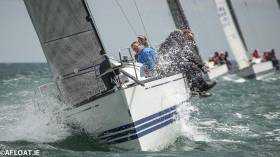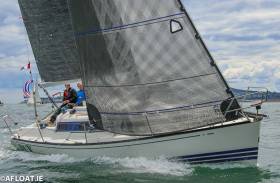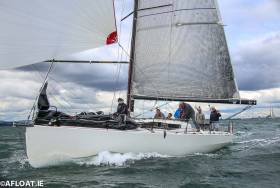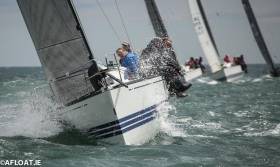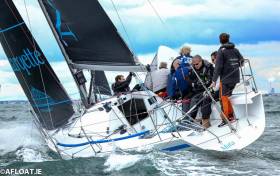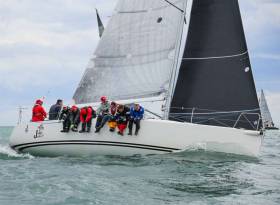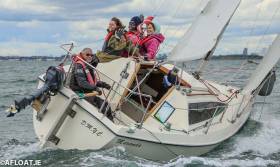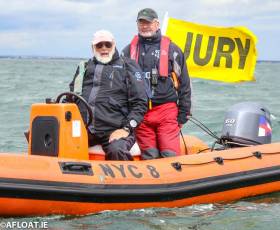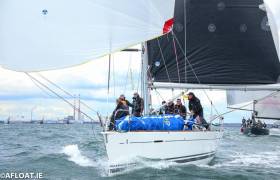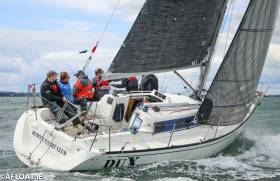Displaying items by tag: ICRA
Caroline Gore-Grimes of Howth is June’s “Sailor of the Month (National Championships)”
In some of the more compact cruiser-racers, the owner-skipper’s preferred role is as crew boss, and this is the approach of HYC Honorary Sailing Secretary Caroline Gore-Grimes on her family’s well-tested X 302 DUX. It’s an arrangement which worked a treat at the Frank Keane ICRA Nats from June 7th to 9th at the Royal St George YC in Dun Laoghaire. IRC Division 3 mustered a fleet of 23 boats, with Rory Fekkes’ souped-up Beneteau F’n Gr8 from Carrickfergus fresh from success in the Scottish Series. It looked like more of the same, with F’n Gr8 winning the first two races. But DUX had logged a couple of useful thirds, and then in the next two days her scoreline was 1,1,1,1,2 to give her IRC 3 by a very clear margin, and make her ICRA Overall Champion as well.
The 2019 ICRA National Championships at Dun Laoghaire may have attracted a total of 93 boats from 24 clubs around Ireland but the spoils were shared between just two Dublin Clubs as five national titles went to Dun Laoghaire's Royal Irish Yacht Club (three) and Howth Yacht Club (two).
After a testing series with a full range of conditions, Anthony Gore-Grimes' Dux from Howth Yacht Club emerged overall winner of the Irish Cruiser Racing Association (ICRA) National Championships sponsored by Frank Keane BMW on Dublin Bay today (Sunday 9th June 2019). The X302 boat won the Division Three national title, one of five decided over the three days thanks to a scoreline of top three places in its 22-strong division.
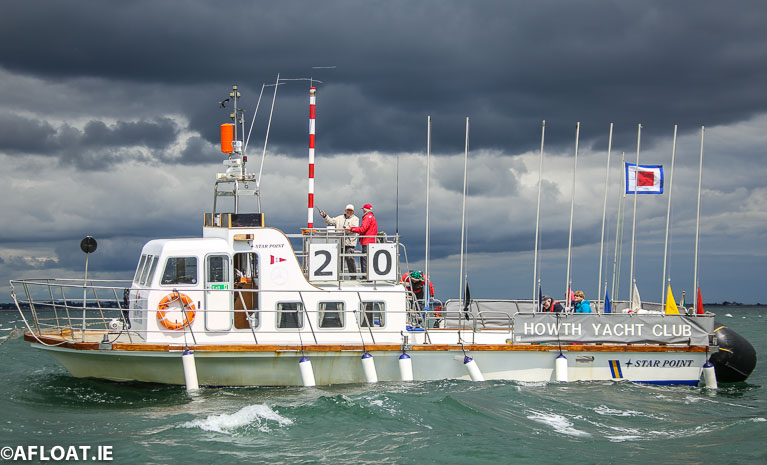 The Howth Yacht Club Star Point Committee Vessel was used for ICRA Class Zero, One and Two fleets Photo: Afloat
The Howth Yacht Club Star Point Committee Vessel was used for ICRA Class Zero, One and Two fleets Photo: Afloat
Sunday's final day was sailed in breeze ranging from zero to 20 knots with sunshine, hailstones and lightning included in the event hosted by the Royal St. George Yacht Club.
“The conditions were challenging for the race officers but, fair play they got all the races away," said Paul Colton, owner of Cri Cri from the Royal Irish Yacht Club in Division Three. “It was a great event, the [fixture] timing worked out well.”
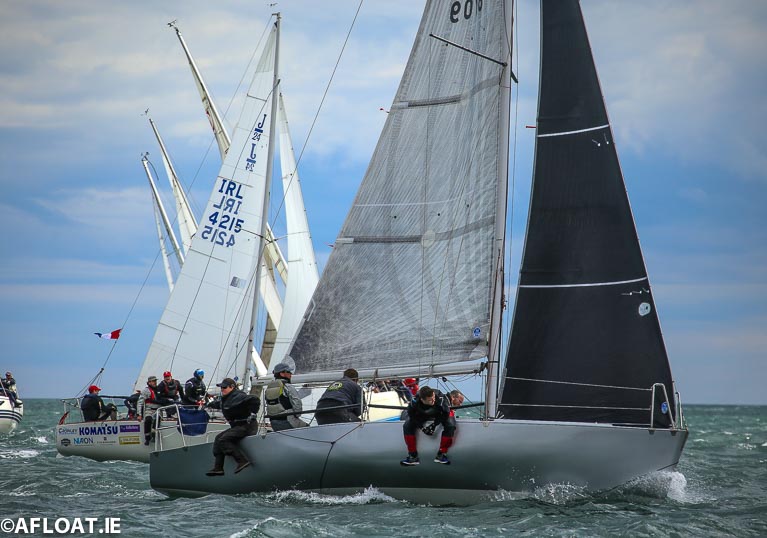 Paul Colton's Cri Cri competing in Class Three Photo: Afloat
Paul Colton's Cri Cri competing in Class Three Photo: Afloat
John Maybury's Joker II from the Royal Irish Yacht Club comfortably won his fourth consecutive Division One national championship title after scoring all first or second places over the seven race series. His title win was one of three for his Dun Laoghaire club while Howth Yacht Club took two other championships.
Paul O'Higgins' Rockabill VI from the Royal Irish Yacht Club emerged victorious in Division Zero for the biggest boats that sailed three coastal courses for the series. His win only came on the tie-break as Jay Colville's Forty Licks from East Down Yacht Club slipped back to second overall in their ten boats fleet.
A steady work rate over the seven races saw Michael and Darren Wrights' Mata from Howth Yacht Club emerge as Division Two National Champions with a race win in the final to seal their grip on their 19-boat fleet. The result saw Nigel Biggs' Checkmate XVIII from the Royal Irish Yacht Club take second with Howth's David Cullen on Checkmate XV staging a comeback to take third.
“We had very testing conditions but the racing was fantastic, very close,” said Ronan Downing, owner of Miss Whiplash from the Royal Cork Yacht Club in Division Two. “We were beaten into fourth overall by just one second in each of the last two races.”
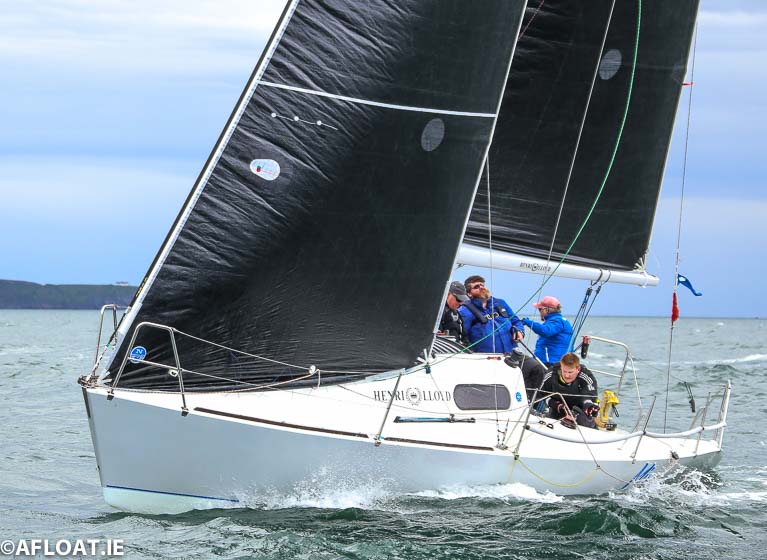 Ronan Downing's Miss Whiplash from Royal Cork Yacht Club Photo: Afloat
Ronan Downing's Miss Whiplash from Royal Cork Yacht Club Photo: Afloat
Back to back wins on the final day, mirroring Friday's racing saw Philip O'Dwyer's Supernova from the Royal Irish Yacht Club take the Division Four national championship title in a four-boat contest. Amongst the white sails Division Five competing for the ICRA Corinthian Cup, Windsor Lauden and Steffi Ennis on Demelza delivered straight bullets for the series in spite of starting 15 seconds late for the final race.
"We had a large number of Under 25's taking part and it was great to see that the Red C Perpetual Trophy was won by an all-woman crew," commented Richard Colwell, Commodore of the Irish Cruiser Racing Association. "Each champion in this year's event is a worthy winner and has had to work very hard to win amongst extremely competitive fleets."
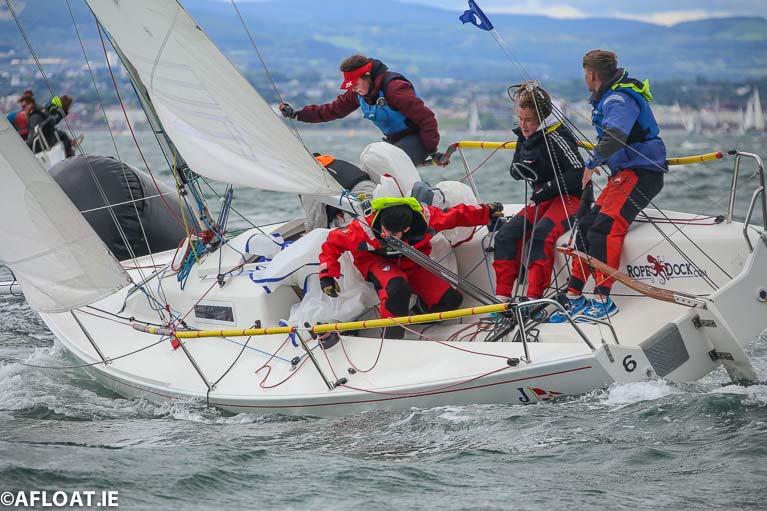 An Under-25 J/80 crew from the host club Photo: Afloat
An Under-25 J/80 crew from the host club Photo: Afloat
"It was particularly pleasing to see how our new ECHO handicap formula delivered a totally different set of results than IRC. Those crews who may have considered this event unattainable in the past can now take part with a chance to see an improvement and progression on their championship chances."
"We set out to hold a first-class national championship, and I think most competitors would agree that the racing was at the highest standards while being enjoyable both on and off the water," added Colwell.
Full results are available here
Read all Afloat's stories from the 2019 ICRA National Championships in one handy link here.
RIYC JPK10.80 'Rockabill VI' Claims ICRA Class Zero Title on Eve of Dun Laoghaire Dingle Race Defence
Royal Irish Yacht Club skipper Paul O'Higgins reclaimed the overall lead of the Class Zero (Coastal) division of the ICRA championships on Dublin Bay today to take the title away from the overnight leader Northern Ireland's Jay Colville in the First 40, Forty Licks.
O'Higgins who is the defending champion in Wednesday's biennial Dun Laoghaire to Dingle Race (race preview here) was declared the ICRA champion after the tie break rule was applied as Rockabill and Forty Licks both finished on the same six points.
Third overall in the nine-boat fleet was the Greystones Sailing Club Grand Soleil 40, Eleuthera on 12 points in the three-race series.
Provisional overall results after day three and subject to protest are here
Read all the latest from the ICRA National Championships in one handy link here.
Howth Yacht Club X302 campaigner Dux has won the Divison Three title of the ICRA National Championships on Dublin Bay.
The Anthony Gore-Grimes skippered entry took the lead in the biggest class of the Royal St. George YC Championships after an impressive three wins on Saturday to outwit Rory Fekkes in the Carrickfergus Modified Beneteau First 8.
Dux beat the Fekkes boat by three points overall with third place overall going to the host club's Brendan Foley in the modified Impala Running Wild.
Provisional overall results subject to protest are here. Read all the latest from the ICRA National Championships in one handy link here.
The Wright Brothers from Howth completed a consistent series of seven races with six top three results to become Division Two National Champions in their first ICRA outing with their new Half Tonner in Dun Laoghaire.
Half Tonners took the top five places overall in the Royal St. George's championships fleet of 19 boats.
Overnight leader Nigel Biggs from the Royal Irish Yacht Club lost out in the final two races today in Checkmate XVIII to finish second overall 2.5 points behind Mata. Third overall is Classics Half Ton World champion David Cullen in Checkmate XV.
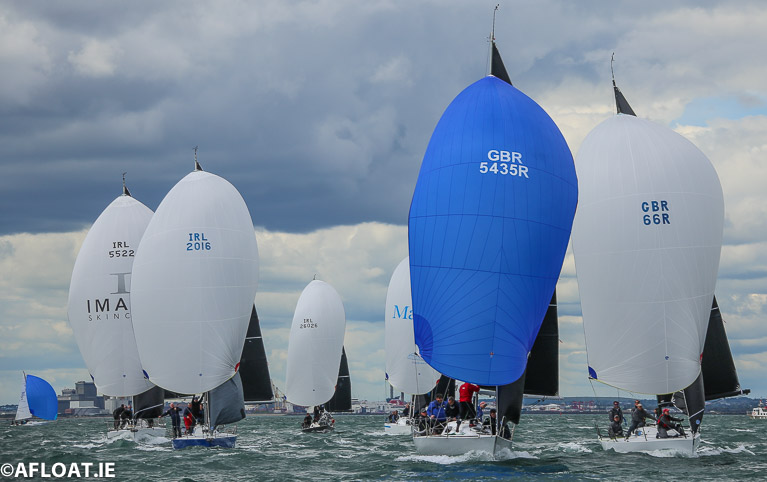 Close racing for the Half Tonners in 22-boat Division Two Photo: Afloat.ie
Close racing for the Half Tonners in 22-boat Division Two Photo: Afloat.ie
Provisional overall results subject to protest are here. Read all the latest from the ICRA National Championships in one handy link here.
The Royal Irish Yacht Club's John Maybury has made it four in a row at the ICRA National Championships this afternoon having sailed a superb seven-race series in which the J109 corinthian skipper and eight-man crew – that included 2004 Olympian Killian Collin on tactics – counted four race wins (with six results in the top two) to clinch the title by a comfortable margin of eight points.
Second overall in what is widely regarded as the stiffest competition of the 93-boat championships was the Kelly family boat Storm from Howth Yacht Club and Rush Sailing Club on 16 points overall.
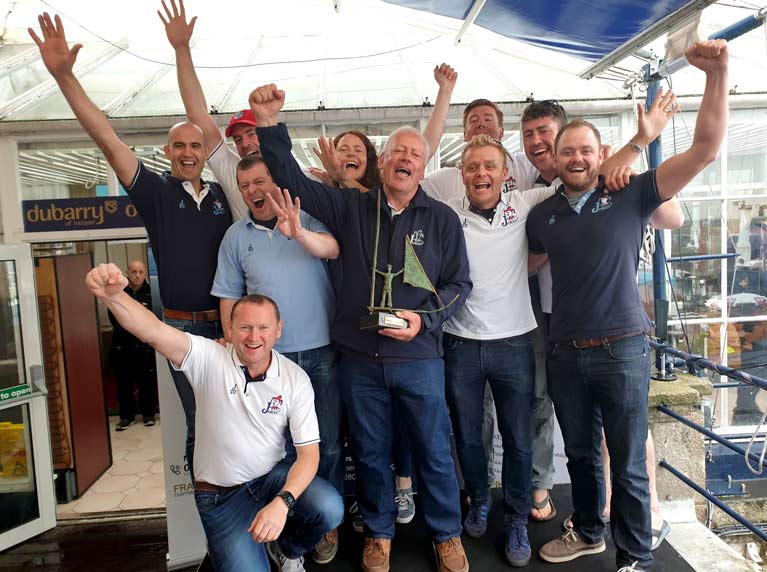 The winning Joker II squad include John Maybury (with trophy), Brian Phelan, Adrian Mulligan, Michelle Fitzgerald, Sarah O'Callaghan Shane Keogh, Ronan Verling, Jason McCleod, Barry Byrne, Brian Byrne and Killian Collins Photo: Maurice O'Connell
The winning Joker II squad include John Maybury (with trophy), Brian Phelan, Adrian Mulligan, Michelle Fitzgerald, Sarah O'Callaghan Shane Keogh, Ronan Verling, Jason McCleod, Barry Byrne, Brian Byrne and Killian Collins Photo: Maurice O'Connell
Three points back in third place, completing the J109 domination of class one, was the new Howth campaign of Outrajeous (Tommy Murphy and Richard Colwell).
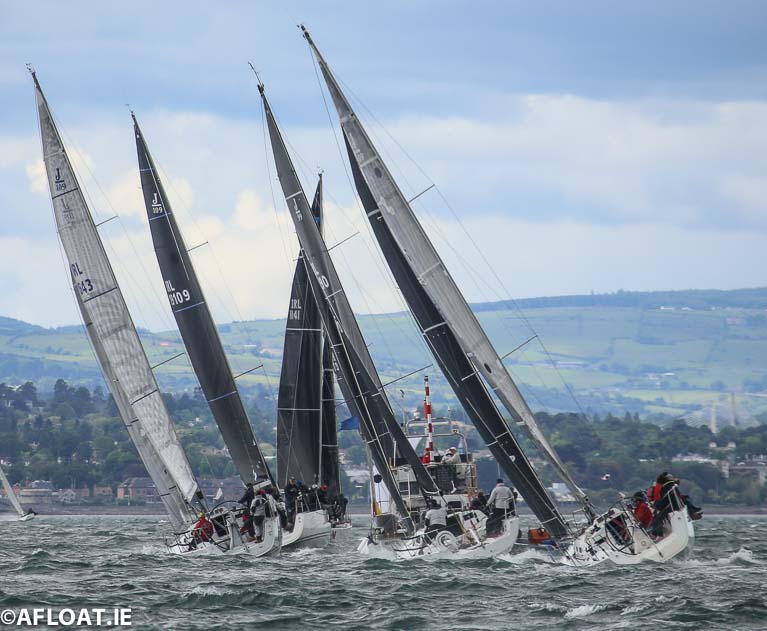 A tight finish in a class one race as the 18-boat fleet favour the committee boat end of the finish line Photo: Afloat
A tight finish in a class one race as the 18-boat fleet favour the committee boat end of the finish line Photo: Afloat
Provisional results after day three and subject to protest are here
Read all the latest from the ICRA National Championships in one handy link here.
Dubious Takes the Lead in ICRA Division Four
Among the four boats racing in Division 4 of the ICRA National Championships, Peter Richardson's Dubious of the host club, the Royal St. George Yacht Club, has taken the lead from Philip O'Dwyer's Supernova of the Royal Irish Yacht Club.
In Division 5, White Sails competing for the ICRA Corinthian Trophy, Windsor Lauden and Steffi Ennis' Demelza from Howth Yacht Club added three more wins to perfect their record for the series so far.
Results here. Read all the latest from the ICRA National Championships in one handy link here.
The ICRA National Championships protest committee has listed eight protests so far at the Dublin Bay event but four claims were withdrawn, according to the event website.
Of the remaining protests at the Royal St. George Yacht Club, two were initiated by the Protest Committee itself chaired by International Race Judge Gordon Davies.
On Friday, in Division Zero, a protest (case number two) was taken by on the water umpire Ailbe Millerick against respondents Yoyo (Brendan Coughlan) and Sail No. 7536 (John O'Gorman) in which a post-race penalty was accepted by 7536, according to the case decisions published here.
And in another class zero protest, a request for redress has been submitted after yesterday's coastal race for yachts Tsunami and Yoyo.
The official noticeboard says that hearing (case number nine) initiated by the Race Committee is 'to be heard as soon as possible after racing'.
Read all the latest from the ICRA National Championships in one handy link here.
Jay Colville’s First 40, Forty Licks from Down Cruising Club, fresh from his success in the 2019 Scottish Series, has taken the lead in the ICRA National Championships after the second 40-mile coastal race sailed today in medium westerly winds on Dublin Bay.
Forty Licks now leads the Royal Irish's Paul O'Higgins' Rockabill VI by a single point heading into tomorrow's final round but a protest for redress taken by the Race Committee naming two competitors may yet affect the overall standings in this class. More on this here.
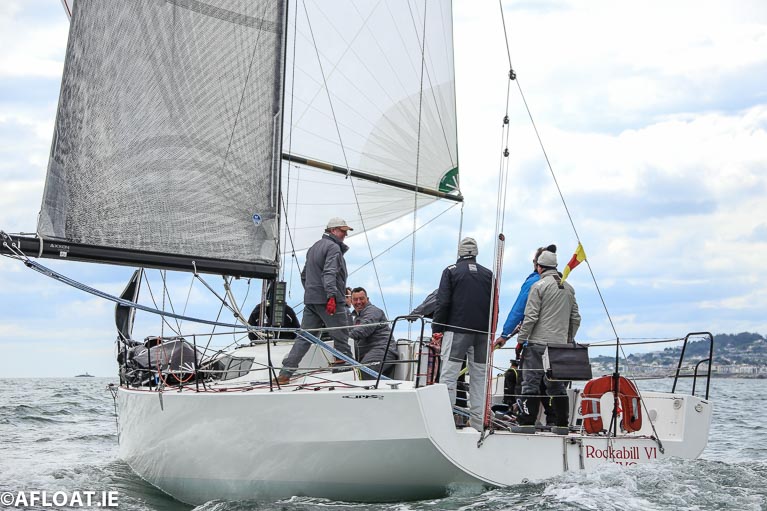 Paul O'Higgins' Rockabill VI Photo: Afloat
Paul O'Higgins' Rockabill VI Photo: Afloat
The Sunfast 3200 Yoyo (John Coghlan) from the Royal St George Yacht Club is third in the nine-boat fleet.
Results here. Read all the latest from the ICRA National Championships in one handy link here.
Where J109s are holding sway in Class One and Half-Tonners in Class Two, Class Three of the ICRA National Championships on Dublin Bay has a refreshing mix of design types at the top of the Royal St. George Yacht Club hosted championships.
And in a shock to the established Class Three pecking order today, Howth's X3202 Dux (Anthony Gore-Grimes) has taken the overall lead in the biggest fleet of 22 boats after some fine sailing produced three race wins to lead Carrickfergus's highly modified Beneteau First class 8.
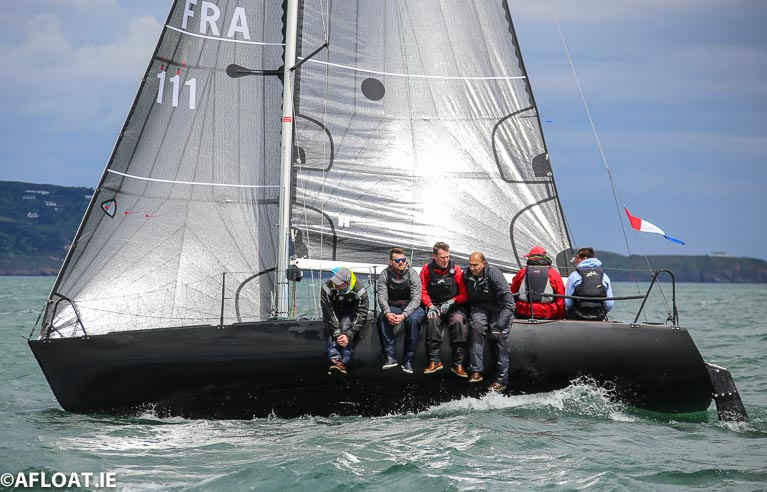 Scottish Series winner 'FnGR8' has dropped to second overall Photo: Afloat
Scottish Series winner 'FnGR8' has dropped to second overall Photo: Afloat
Toppling the Northern Ireland boat - even by a single point - is no mean feat, the Rory Fekkes skippered black boat was the winner of Cork Week overall last year and last month Fekkes was the winner of every race, bar one, at the Scottish Series.
Third - but seven points adrift of second overall - is the host club's Impala Running Wild skippered by Brendan Foley.
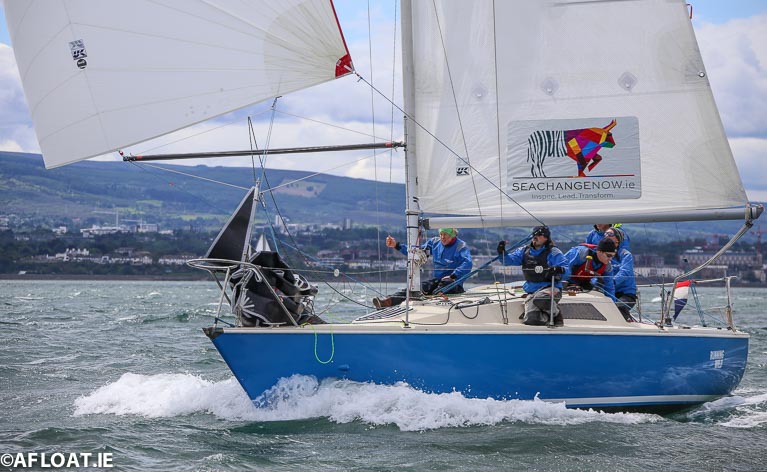 Running Wild skippered by Brendan Foley of the Royal St. George Yacht Club Photo: Afloat
Running Wild skippered by Brendan Foley of the Royal St. George Yacht Club Photo: Afloat
Results are here. The final two races are scheduled tomorrow from 11 am with breeze forecast to be westerly at eight knots on Dublin Bay
Read all the latest from the ICRA National Championships in one handy link here.


























